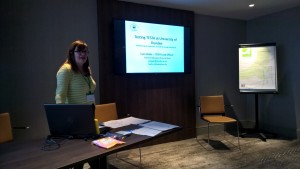May
2016
SEDA Spring Teaching and Learning and Assessment Conference 2016 Innovations in Assessment and Feedback Practice 12th -13th May 2016 Edinburgh
Parallel session Testing TESTA success at Dundee? Does TESTA Pass the TEST? One University’s Perspective Lynn Boyle, Neil Taylor
Transforming the Experience of Students Through Assessment (TESTA). This paper focused on early experiences of using TESTA. There are some key steps involved in this which Tansy Jessop (2010) calls the 10 steps to TESTA but they were adapted for this and included:
- Programme audit – so gathering information for the whole programme
- Gathering students views – 28 item questionnaire with nine scales
- Focus groups with final years usually 1-2 group
Two programmes were used for a pilot and the outcomes were robust, positive and relevant. Phase two was then undertaken and this involved 5 programmes, 0.5FTE quality enhancement officer and 2 lecturing staff. There were issues related to time and scale. So the 10 steps are an issue as was getting a whole programme team into a room for a day and undertaking the work module by module.
There are 341 programmes and so there did need to be some consideration of how to make this scalable. To support this the team created a TESTA brick which is a one page document what contains all the key information about a module when the team complete this. There is also a need to collect samples of feedback for each year. The samples are reviewed and the words are counted to develop an estimate of how many words feedback a student gets each year. The themes are also drawn out as points to consider. Phase 3 involved 16 programmes and giving feedback to the programme teams has always been the hardest part as there is a certain level of concern about the feedback. With the increase in the programmes resources are an issue and so the 12 Associate Deans Education have taken part in reviewing feedback and have done this across discipline. This has worked well.
This process whilst good does create some issues. At the initial meeting where findings from focus groups and analysis are done staff are very angry and question your right to say things are not quite right.
It is now proposed to adopt TESTA across the whole institution but to do programmes the year prior to the programme periodic review. There is enough data now in the institution to use this as the data set rather than using the TESTA data. The bricks have been well received and is an easy way to see the programme.
In terms of feedback some of the language used was emotive and not all related to the learning outcomes and did not always provide guidance for development. This process does facilitate discussion around this and the NSS in this area has increased by 6% on the programmes that have been involved in this process.
